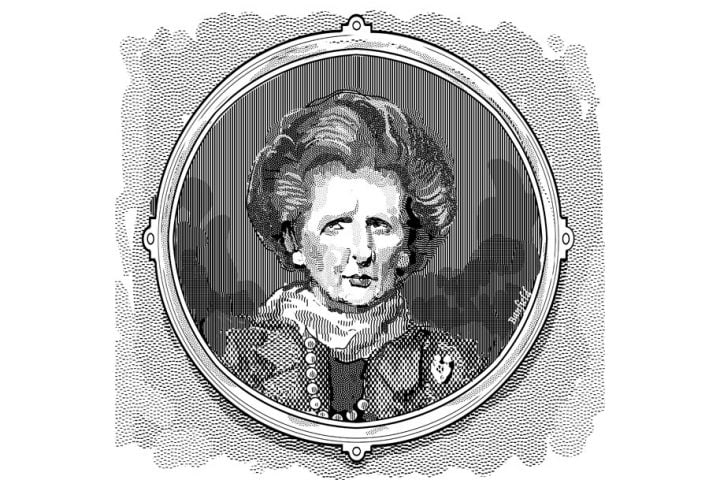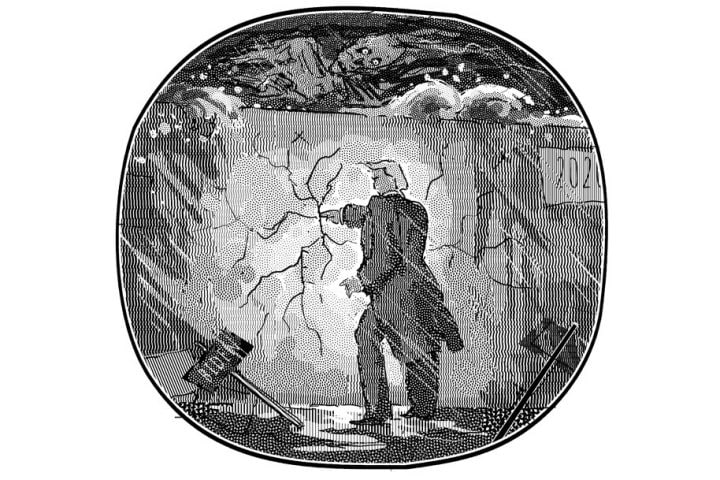Love and Death
Algis Valiunas follows the grossest accounts of great authors about human reactions to plagues, giving the impression that these reactions are limited to degradation and heroism (“In Plague Time,” Summer 2020). We have no reason to doubt Thucydides’ account that the prospect of imminent death led the Athenian people to abandon law and decency, nor Boccaccio’s beguiling description of the psychological mechanisms by which people sought to divert attention from the awful (what Montaigne called “the vulgars’ remedy”), nor Daniel Defoe’s gross painting of casual deaths. Alas, the prospect of death seldom improves humans. But that is a lesson too easily learned and of little usefulness. So is the fact—all too evident among us today—that fear, even unfounded, is a powerful motivator that only heroic effort can overcome.
Had Valiunas focused a bit more on Samuel Pepys and Alessandro Manzoni, he might well have pointed to natural habits of the heart that, Hobbes notwithstanding, even fear of imminent death often is powerless to cancel—namely common sense and love. Consideration of these is instructive in itself and peculiarly useful in our circumstances.
Pepys, it seems—wrapped up as he was in his career and focused on his collection of fine wines—reacted to the Great Plague by withdrawing a bit from society and focusing even more on what was most important to him. Valiunas gives the impression that this was narcissism. But what is a non-hero supposed to do in the face of a plague? Even heroic self-sacrifice, such as serving the sick, costs much and avails little. Plunging into the panic accentuates the harm, and fantasy is a kind of drunkenness. Pepys took some elementary precautions, but continued to do the things he really cared about, be those ever so mundane. He may only have done a little good for himself, but harmed no one. Common sense. Think how much better today’s Americans would all be if, high and low, we had minded our own business as this plague too passed over us?
Mistakenly, Valiunas describes Manzoni’s Betrothed as “among the classics of orthodox Roman Catholicism.” Not quite. The novel is a long illustration of northern Italy’s deepest religion: common sense. The plot’s background consists of a struggle between the institutional Church, whose corruption and prostration to power the author spares no effort to scorn, and a holy, unordained monk. But the novel’s protagonist is Renzo, a young man who “works well,” has a little vineyard on the side, ends up starting a business, and just wants to marry his childhood sweetheart. Focused on these basics and occasionally sustained by the monk’s true Christianity, Renzo navigates the storms of Church, State, and ignorance. He and the reader learn, for example, that the governmental control of prices causes shortages. They experience the dynamics of fear. Throughout the trials, Renzo’s determination to marry his beloved draws them along, into the pit of the plague. They learn that keeping hold of common sense about the most important things is the most one can do against it.
In that regard, in one of the novel’s most amusing scenes, the holy monk and Renzo bring the powers of Christianity and common sense to bear on his beloved Lucia to renounce the vow of virginity she had made to the Virgin Mary in a troubled time. The monk tells her about vows made under duress. Renzo pipes in: “we’ll just name our first daughter, Mary!”
Now about the importance of love—sexual love—especially in times of trial. Recall Plato’s Symposium, an account of a dinner party at which a bunch of Athenian yuppies discussed the meaning of love. The dialogue among them reads as a catalogue of today’s elite opinions: love is desire in general, or for this or that; it is some kind of need; or some kind of devotion; it is about someone; it may be homoerotic; at any rate, it is some kind of passion. None of that having satisfied, the guests press Socrates who, after his usual profession of ignorance, says that the best thing he had ever heard on the subject had come from Diotima, a woman prophet, who said that love between a man and a woman is the most wondrous of things. Plato lets us hear the guests’ collective groan from two and a half millennia away: Oh, that? It’s so ordinary!
Socrates, as usual, explained the ordinary’s essentiality. Think about what happens when man and woman get together. Babies happen, that’s what. Wonder of wonders. Whether the man and woman whose bodies unite know or care, what they do transcends them and points to eternity. It also means that mom and dad get busy setting up house. Together with others like them they make the city that worships the gods. And that does everything else that cities do.
Love between man and woman—sexual love, to be sure—is the ever-present touchstone of the most fundamental of human realities. Christian thought elaborated on this insight, and modern observation of dehumanizing ideologies confirmed it.
Here I can only state the Christian understanding of God as Love. Suffice it to note that the popular saying “love makes the world go ’round” is very much bedrock Christian theology, never better imagined than by Dante’s Divine Comedy, the final verse of which, describing the Beatific Vision, reads “And I saw the Love that moves the sun and the other stars.” That Love, which pervades and moves the universe, had drawn Dante to itself through his love for his beloved Beatrice. Neither Dante nor anyone else pretends that any ordinary person’s love for their beloved can lead through the detailed recognition of evil, redemption, and good that Dante imagined. But it is difficult if not impossible to deny that any man or woman who understands sexual relations with loving seriousness is drawn thereby to the realities by which Socrates shocked Athenian sophisticates.
Love between a man and a woman being the most gripping of realities, it is the one that all earthly attachments of lesser worth—including to wealth and power, never mind ideology—find it most difficult to occlude. In Manzoni’s most horrid scene, a mother—herself dying from the plague—carries her daughter’s meticulously dressed corpse to the cart of stinking cadavers on its way to the pit, and begs to lay her on it lovingly. Shaken by this embodiment of the Pieta,the nearly dehumanized driver respectfully makes room. George Orwell, C.S. Lewis, and ordinary experience remind us that nature’s call to loving unity between man and woman is the rock against which all B.S. is likeliest to crash.
Which brings us back to our plague, the worst effect of which—by far—has been to abet the ruling class’s substitution of its own claims for ordinary people’s priorities. The COVID-19 virus’s infection fatality ratio of 0.01% is inconsiderable. The claims on Americans have been enormous. The more baseless the claim—e.g., the necessity of masks—the more forcefully it is insisted upon. That bending you to power is the point. Keeping your priorities straight is the challenge.
Angelo M. Codevilla
Plymouth, CA
Algis Valiunas replies:
One is always gratified when a fellow contributor, and especially so distinguished a contributor as Mr. Codevilla, takes the trouble to respond publicly to a piece one has written. Unfortunately, that gratification fades as Codevilla, in hot pursuit of his argument, misrepresents what I say about Samuel Pepys and breezes past without mentioning key points I make about Alessandro Manzoni.
I do not accuse Pepys of narcissism. I do say that he tried to keep his daily life agreeable as possible while tens of thousands of his fellow Londoners were dying, and that here “Healthy egotism and a certain insensibility to the suffering of others helped.” Narcissism is unhealthy egotism. Pepys was “a slightly better-than-average sensual man,” and his self-love and self-absorption showed no signs of mental or emotional pathology. At worst he was capable of joking about the deaths of his physician and surgeon, in whose absence he considered himself free to enjoy some of the “good drink” that they had forbidden him. He enjoyed a good laugh as well as a good drink, and sometimes a certain insensibility can be amusing, as his was in this case, even if it displayed a touch of callousness or cruelty.
Despite Codevilla’s sneering, The Betrothed is as devoutly Roman Catholic as a modern novel is likely to get. Codevilla evidently believes that the failure of “the institutional Church” to live up to the demands of the faith it professes annuls that faith. One need only consider the current scandals bedeviling the priesthood to see that is not the case. The truth of the teaching remains inviolable, however the bad behavior of certain religious personnel may tarnish its reputation. And in any case Manzoni hardly scorns the clergy at large as Codevilla alleges. There is no shortage of heroic priests as the plague does its worst:
The most general, prompt and constant response to the harsh requirements of the situation came from the clergy. Both in the lazarettos and in the city itself, their succor never failed. They were to be found wherever there was suffering. They were always in the midst of the sick and the dying, even when they were sick or dying themselves.
When Manzoni shows spiritual mediocrity he does so in contrast with real excellence of soul. The country priest Don Abbondio refuses to marry Renzo and Lucia because he fears the evil Don Rodrigo would kill him if he did; but he feels ashamed when Cardinal Federico Borromeo, who not only talks a good game but lives his belief, chastises him for his lack of courage, which is really a lack of faith. It is by the most exacting standards that a true believer must measure himself, the cardinal teaches, and so does Manzoni. “Since in this ministry, however you came to enter it, courage is necessary for the fulfillment of your duties, how have you failed to reflect that there is one who will infallibly give you courage when you ask him for it? Do you believe that all the millions of martyrs who died for our faith had natural courage, or that they had no natural concern for their lives?” Something much more potent and sublime than common sense is called for in the world of this novel.
In the face of a rampaging disease that kills more than half the population, what response does common sense offer? If one asks how God could let such horrors happen, common sense answers that He might well be incapable, or insensible, or curious, or malevolent, or non-existent. The last thing it would endorse is the belief of “God as Love.” Faith alone does that, and often only with serious difficulty.
For Manzoni, sexual love is not necessarily the highest love that men and women demonstrate. For many it even yields under pressure to self-love and self-preservation. Manzoni writes (as I mentioned) that in plague time “the very links of human affection…became words of terror”; when simply being near the people one loves most can kill you, it is common sense to abandon husband or wife or child if any of them becomes infected. As I also mentioned, Manzoni reveres the disinterested selfless love of the Capuchin priests who staff the vast public hospital for plague victims. “There was beauty in their acceptance of the task, for no other reason than because there was no one else who would take it on, with no other object but that of serving their fellow-men, and without any hope in this world but that of a death which few men would envy, though it could truly be called enviable.” Perhaps their courageous service offers even more telling proof that God is Love than Renzo’s heroic passion for Lucia does.


